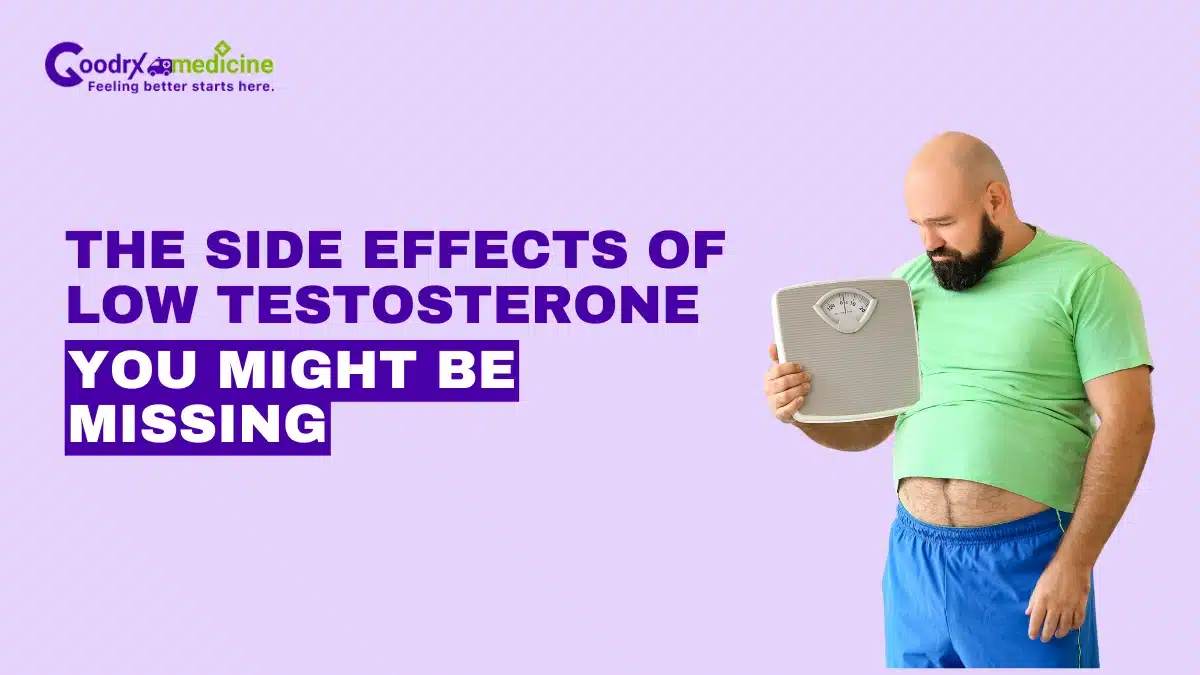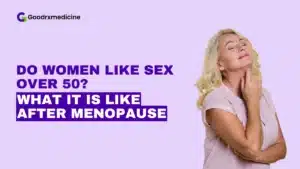Low testosterone (Low T) is more than just a decline in hormone levels. It can have a minor but significant influence on almost every element of a man’s health and well-being. While Testosterone is well known for its role in muscular growth, energy, and sexual function, it also influences emotional stability, cognitive performance, bone density, and even heart health.
When levels fall below the normal range, mild symptoms, such as fatigue, irritation, reduced sexual desire, or decreased motivation, may occur. These symptoms are frequently mistaken for stress or aging. Over time, these symptoms might worsen, impairing relationships, physical performance, and general quality of life.
Understanding the side effects of Low Testosterone is essential since early discovery and therapy can help prevent long-term problems. In this article, we’ll look at the often-overlooked consequences of Low T and why detecting them early may make all the difference.
Side effects of Low Testosterone in men
While a gradual decrease in Testosterone is a normal part of aging, a level that falls too low (below 300 to 1000 nanograms per deciliter) can result in several serious physical and psychological side effects and health risks.
Let’s have a look at these Low Testosterone side effects in males or Assigned Males at Birth (AMABs).
Save up to 90% on your medicine bills
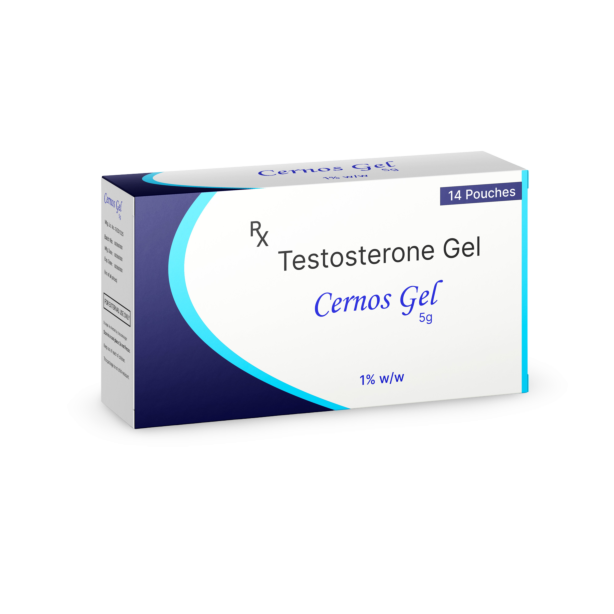
Cernos Gel 1% w/w
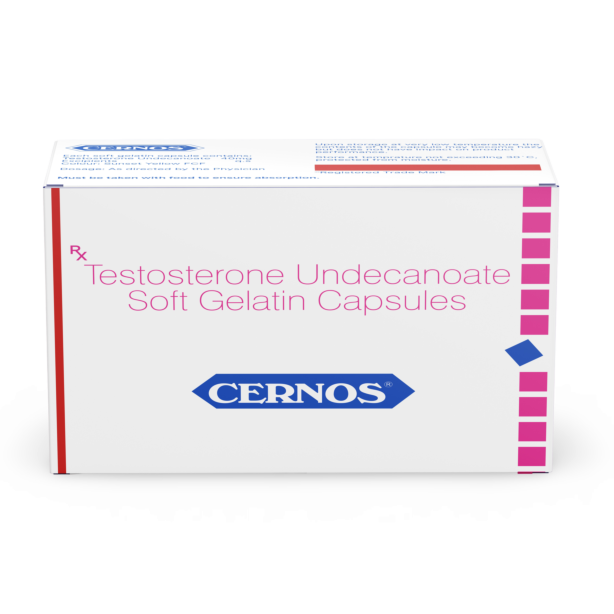
Cernos 40 mg Soft Gelatin Capsule
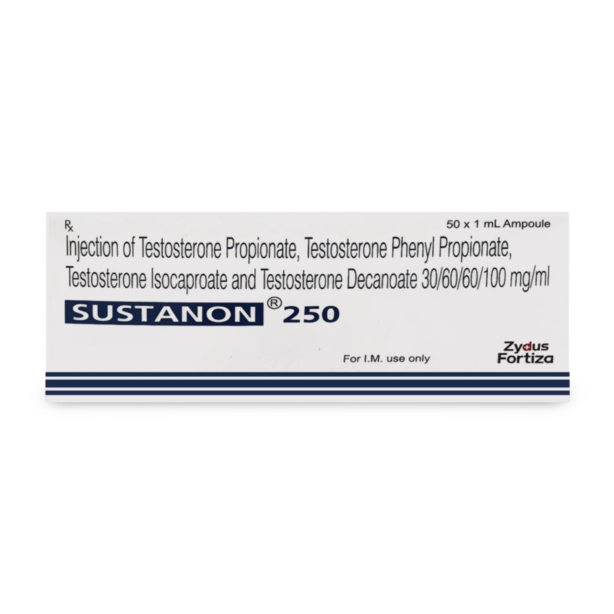
Sustanon 250 Injection
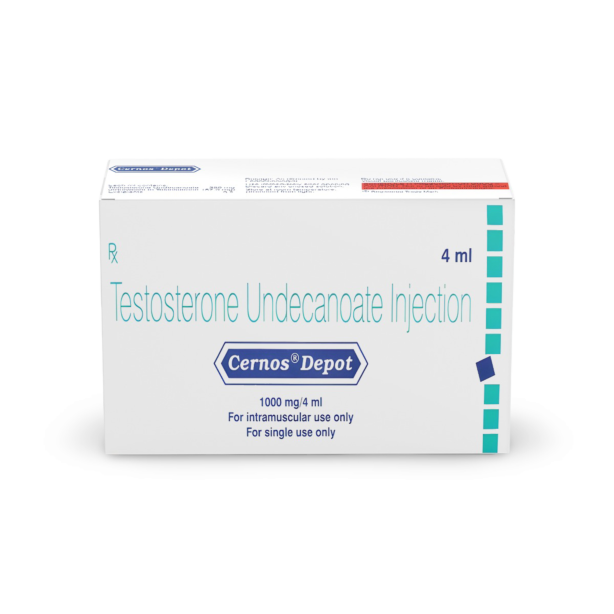
Cernos Depot 1000 mg Injection
Physical side effects
Low Testosterone in males can cause the following physical side effects:
- Changes in sexual function: Low T can significantly affect a man’s sexual health. It can cause a reduction in sexual desire or libido and Erectile Dysfunction (ED). Decreased Testosterone levels can also cause a decrease in sperm count and volume of semen, potentially leading to infertility.
- Muscular and bone health: Testosterone is required to grow and maintain muscular mass and strength. A decrease in this hormone can cause a considerable loss of lean muscle mass and a decrease in strength and endurance. Furthermore, Testosterone deficiency can cause bone mass loss, increasing the likelihood of developing Osteoporosis and fractures.
- Increased body fat and weight gain: A reduction in Testosterone can result in an increase in body fat, particularly around the waist. In some situations, males might develop Gynecomastia, which is an enlargement of the breast tissue.
- Fatigue and low energy: Men with Low Testosterone levels frequently experience persistent exhaustion and a lack of energy, even after obtaining enough sleep.
- Hair loss: Although male-pattern baldness is generally inherited, Low Testosterone can cause face, pubic, and body hair loss.
- Reduced testicle size: A drop in Testosterone production can also lead to a reduction in testicle size.
- Sleep disturbances: Low Testosterone can cause Insomnia and restlessness. It is also linked to Obstructive Sleep Apnea (OSA), a potentially dangerous disease that interrupts breathing while sleeping.
Psychological side effects
Apart from physical changes, Low Testosterone can have a significant influence on a person’s mental and emotional health, often involving:
- Mood changes: Low T has been found to be linked to various emotional and psychological problems. Many males experience irritability, Anxiety, or Depression. This might result in decreased motivation and self-confidence, as well as an overall sense of not being themselves.
- Mental troubles: Low testosterone levels can impair mental abilities and memory. It may induce a fuzzy thinking perception, making it difficult to concentrate, recall things, or stay focused on work or personal duties.
Other health concerns and complications
Low T levels can have long-term consequences, including major health difficulties, such as:
- Metabolic syndrome: Low Testosterone is strongly linked to metabolic syndrome, a set of disorders, including Hypertension (High Blood Pressure) and High Cholesterol.
- Cardiovascular illness: Low serum (body) Testosterone is strongly associated with an enhanced chance of cardiovascular diseases, including heart attacks and strokes. While the specific association is still being investigated, it is an essential consideration for males with Low T.
- Diabetes: Testosterone stimulates the body’s cells to respond to insulin. Low Testosterone levels can impact insulin resistance, potentially leading to the development of Type 2 Diabetes.
Low Testosterone signs in women
Most people consider Testosterone as a male hormone. However, women or Assigned Females at Birth (AFABs) also produce this vital hormone through their ovaries and adrenal glands, but in minimal amounts. In women, Testosterone is essential for promoting sexual function, muscle strength, bone health, mental stability, and general well-being.
Although most of the side effects of Low T are common among men and women, females with Low Testosterone may show the following unique symptoms:
- Menstruation and reproductive issues: Low Testosterone levels can have an impact on a woman’s reproductive health, perhaps resulting in irregular menstrual cycles or infertility.
- Hair and skin changes: Some women with Low T may develop thinning or hair loss, as well as dry or fragile skin.
- Vaginal dryness and discomfort: Low T levels may damage tissue health and lubrication, resulting in vaginal dryness and pain during intercourse.
Managing Low Testosterone levels side effects
Managing the side effects of Low T involves a mix of medical therapy and lifestyle adjustments aimed at restoring hormonal balance and enhancing overall health.
Depending on the cause and severity, doctors may prescribe Testosterone Replacement Therapy (TRT), hormone treatment for both men and women, or specific medications that relieve certain symptoms. As per a review published in the Cureus journal in 2024, TRT can significantly reduce vaginal dryness associated with Low T.
Regular strength exercise, a balanced diet rich in protein and healthy fats, proper sleep, and stress management can all help improve natural Testosterone levels while also overcoming tiredness, muscle loss, and mood changes.
Maintaining a healthy weight, limiting alcohol use, and avoiding smoking all benefit hormone health. Furthermore, treating underlying diseases such as Diabetes, thyroid problems, or chronic stress can dramatically improve outcomes.
Early diagnosis and a specific care strategy are essential for preventing long-term problems and restoring energy, confidence, and quality of life.
Conclusion
Low Testosterone (Low T) levels can have major health consequences for both the physical and mental health of men and women. Its effects are diverse, ranging from decreased muscle mass, fatigue, and weight gain to mood changes, reduced sexual desire, and mental decline.
If left untreated, it may lead to more serious problems, including Osteoporosis, cardiovascular disease, and metabolic disorders. Recognizing these signs and side effects of Low Testosterone early and obtaining medical assistance is essential for accurate diagnosis and treatment.
Lifestyle adjustments, such as balanced eating, regular exercise, stress management, and quality sleep, can all assist in maintaining healthy Testosterone levels. However, medical intervention like TRT may be required in some circumstances.
Testosterone is essential for general well-being, so managing imbalances as soon as possible will boost energy, mood, and quality of life.

Frequently Asked Questions
Can Low Testosterone affect body temperature regulation?
Yes, Testosterone regulates metabolism, which affects body heat generation. Low levels may induce sensitivity to cold or frequent chills, particularly in the extremities, due to a slower metabolic rate and less efficient circulation.
Do Low T levels lead to increased skin dryness?
Yes. Testosterone affects skin oil production through the sebaceous glands. Lower T levels can reduce natural oils, resulting in dryness, flakiness, and itching, particularly in elderly men or those with hormone problems.
Do Low Testosterone levels induce ringing in the ears (Tinnitus)?
Yes. Although rare, hormonal changes caused by Low Testosterone might alter blood flow and nerve activity in the inner ear, perhaps contributing to Tinnitus or a slight hearing loss in some individuals.
Can Low T cause frequent urination?
Yes. Low Testosterone levels can affect bladder muscle tone and prostate health, causing increased nighttime urination (Nocturia) or urgency even in the absence of urinary tract infections or prostate enlargement.
Does Low Testosterone lead to hot flashes in men?
Yes, similar to Premenstrual Syndrome (PMS) hot flashes in women, men with extremely Low Testosterone might experience hot flashes as a result of abnormalities in temperature control caused by Low T levels.
When referencing outside resources, GoodrxMedicine always provides full citations. To learn more about the measures we use to maintain the quality of our content, please review our Content Information Policy.



